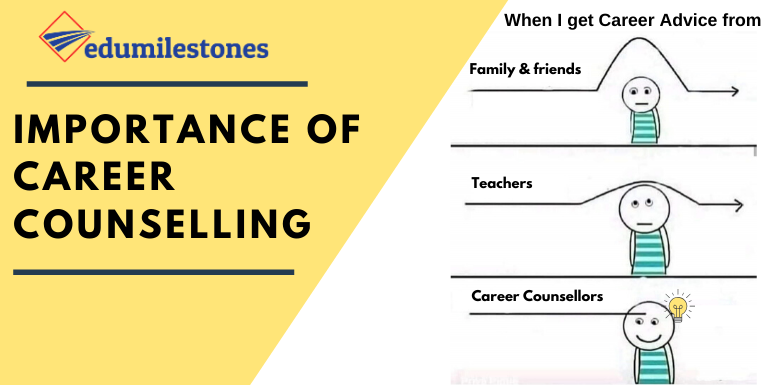Career guidance courses are designed to equip individuals with the necessary skills and expertise to become proficient career counsellors. These specialized programs offer comprehensive training, emphasizing a deep understanding of career theory, practical application of assessment tools, effective counselling techniques, and ethical guidelines. By enrolling in these courses, participants gain in-depth knowledge and practical skills essential for assisting clients in making well-informed career choices and effectively managing their professional development.
Unlocking Your Potential: The Benefits of Career Guidance Courses
1)Professional Skills Development: Career guidance courses provide comprehensive training in counselling techniques, assessment tools, and interventions specific to career development. Individuals gain expertise in guiding others through the career decision-making process, facilitating self-assessment, and assisting with career planning.
2)Knowledge of Career Theories and Models: These career guidance courses delve into various career theories and models, equipping individuals with a solid understanding of the factors influencing career development. They learn about different approaches to career counselling, enabling them to apply appropriate theories and strategies when working with clients.
3)Ethical and Legal Awareness: Career guidance courses emphasize the importance of ethical practice and adherence to professional standards. Individuals learn about ethical guidelines, confidentiality, informed consent, and boundaries in the counselling relationship. They also gain awareness of legal considerations related to career counselling.
4)Effective Communication and Counselling Skills: Career guidance courses focus on developing effective communication and counselling skills. Individuals learn active listening techniques, empathy, and how to build rapport with clients. They also acquire skills in asking probing questions, providing feedback, and offering guidance and support.
5)Assessment and Interpretation: Career guidance courses involves the use of various assessment tools to evaluate clients interests, personality traits, skills, and values. These courses teach individuals how to administer, interpret, and discuss assessment results with clients, helping them make informed career decisions.
6)Career Planning and Guidance Strategies: Individuals learn how to assist clients in creating personalized career plans. They acquire strategies for goal-setting, identifying suitable career paths, exploring job opportunities, and overcoming obstacles. Career guidance courses equip individuals with resources and techniques to guide clients through the job search process.
7)Cultural Sensitivity and Diversity Awareness: Effective career counselling considers the influence of cultural and diversity factors on career development. These career guidance courses emphasize cultural sensitivity, promoting an understanding of how factors such as race, ethnicity, gender, and socio-economic background impact career choices. Individuals learn to provide inclusive and culturally competent counselling services.
8)Self-Reflection and Personal Growth: Engaging in a career guidance course often involves personal self-reflection. Individuals gain insights into their own values, interests, and career aspirations. This self-reflection contributes to personal growth and self-awareness, enhancing their ability to assist clients effectively.
9)Professional Networking and Collaboration: Career guidance courses offer opportunities to network and collaborate with other professionals in the field. Individuals can connect with experienced career counsellors, attend workshops or conferences, and engage in discussions that broaden their understanding and perspectives.
10)Career Opportunities: Completing a career guidance course can open doors to various career opportunities. Graduates can pursue careers as career counsellors in educational institutions, private practices, non-profit organizations, or corporate settings. They can also provide career consulting services or work as independent career coaches.
In summary, undertaking a career guidance course provides individuals with specialized knowledge, skills, and tools to assist others in making informed career decisions. It offers opportunities for personal growth, professional development, and the ability to positively impact individuals career trajectories.
Maximizing Your Opportunities: How Career Guidance Courses Open Doors to Success
Completing career guidance courses opens up several opportunities for individuals interested in pursuing a career in the field. Here are some potential opportunities in career guidance courses:
1)Career Counsellor in Educational Institutions: Many schools, colleges, and universities employ career counsellors to support students in their career exploration, decision-making, and planning. As a career counsellor in an educational institution, you can work with students of various age groups to help them navigate their academic and career paths.
2)Career Counselling Centers: Career counselling centers, either independent or affiliated with organizations, provide specialized career counselling services to individuals seeking guidance at different stages of their careers. This can include assisting with career transitions, conducting assessments, providing career planning support, and offering job search strategies.
3)Private Practice: Some individuals choose to establish their own private career counselling practice. This allows you to work independently and offer personalized career counselling services to clients. Private practice gives you the flexibility to set your own hours, determine your target clientele, and tailor your services according to your expertise and interests.
4)Non-profit and Community Organizations: Non-profit organizations, community centers, and government agencies often have career counselling programs to support individuals from diverse backgrounds. These organizations may focus on providing career guidance and support to specific populations, such as unemployed individuals, veterans, immigrants, or individuals with disabilities.
5)Corporate Career Development: Many companies have internal career development departments or hire external career counsellors to support their employees professional growth. In these roles, you may assist employees in career planning, skill development, and navigating career advancement opportunities within the organization.
6)Vocational Rehabilitation Services: Career counsellors are often employed by vocational rehabilitation services, which assist individuals with disabilities in their career development and integration into the workforce. As a career counsellor in this field, you would provide support, resources, and guidance to individuals overcoming barriers to employment.
7)Consulting and Freelancing: With expertise in career counselling, you can offer consulting services to organizations or individuals seeking career-related guidance. This can include conducting workshops, providing career assessments, developing career development programs, and offering one-on-one counselling sessions.
8)Online Career Counselling: The rise of digital platforms has created opportunities for online career counselling. Through virtual platforms, you can offer career counselling services remotely to clients worldwide, providing flexibility and accessibility in supporting individuals with their career needs.
Additionally, completing career guidance courses can also open doors to related roles in areas such as career coaching, talent management and workforce development. Overall, completing career guidance courses equips individuals with the knowledge, skills, and credentials necessary to pursue diverse and rewarding opportunities in the field of career counselling.
Standing Out from the Crowd: The Impact of Career Guidance Courses on Your Personal Brand
A career guidance courses can be highly useful for brand building by providing individuals with the necessary knowledge, skills, and tools to effectively craft and develop their personal brand or their business. Heres how a career guidance courses can contribute to brand building:
1)Self-Reflection and Personal Branding: Career guidance courses often involve self-assessment exercises and reflection activities that help individuals gain a deeper understanding of their values, strengths, passions, and unique qualities. This self-awareness is crucial for building an authentic personal brand that accurately represents who you are and what you stand for.
2)Identifying Unique Value Proposition: Career guidance courses assist individuals in identifying their unique value proposition – the distinctive combination of skills, experiences, and qualities that set them apart from others. By understanding their strengths and differentiators, individuals can develop a personal brand that showcases their unique contributions and positions them as an expert in their chosen field.
3)Networking and Professional Relationships: Career guidance courses provide guidance on networking strategies and building professional relationships. Networking is a powerful tool for brand building, as it allows individuals to connect with industry professionals, gain visibility, and leverage their network for opportunities. By cultivating genuine connections, individuals can expand their brand reach and establish a strong professional reputation.
4)Consistency and Brand Identity: Career guidance courses emphasize the importance of consistency in brand building. They help individuals establish a cohesive brand identity by aligning their values, messaging, visual elements, and behaviours. Consistency across various touchpoints ensures that individuals are recognized and remembered for their unique brand attributes.
5)Target Audience and Brand Positioning: Career guidance courses helps individuals define their target audience and understand the needs and preferences of their desired market. This knowledge enables individuals to strategically position their personal brand to appeal to their specific audience, ensuring their messaging, tone, and content resonate effectively.
6) Continuous Professional Development: Career guidance courses emphasize the importance of continuous learning and professional development. Counsellors are encouraged to stay updated with industry trends, counselling techniques, and emerging research. Engaging in ongoing professional development allows counsellors to enhance their skills, expand their service offerings, and adapt to the evolving needs of their clients, fostering business growth.
7)Marketing and Branding: Building a successful counselling business requires effective marketing and branding strategies. Career guidance courses provide insights and techniques for developing a compelling brand identity, crafting a unique value proposition, and establishing a professional image. Counsellors learn how to create marketing materials, differentiate themselves from competitors, and effectively promote their services to attract clients.
8)Client Acquisition and Retention: Career guidance courses equip counsellors with skills to acquire and retain clients. These courses cover various aspects of client acquisition, including networking, referrals, online marketing, and outreach strategies. Counsellors learn how to connect with potential clients, build relationships, and provide exceptional service to ensure client satisfaction and loyalty.
9)Online Presence and Technology: Career guidance courses often address the importance of an online presence and leveraging technology in counselling businesses. Counsellors learn how to create and optimize their professional website, utilize social media platforms, and effectively use digital tools for client management, scheduling, and communication. These skills enhance counsellors visibility, accessibility, and efficiency in running their businesses.
10) Career Planning and Growth: Career guidance courses assist individuals in creating a strategic career plan aligned with their personal brand and long-term goals. This plan serves as a roadmap for professional growth and development, enabling individuals to make deliberate choices that align with their brand identity and reinforce their unique value proposition.
By leveraging the knowledge, skills, and resources provided in a career guidance courses, individuals can strategically build and enhance their personal brand. From self-reflection and value proposition identification to effective communication, online presence, and networking, these courses equip individuals with the tools necessary to establish a strong personal brand that resonates with their target audience and opens doors to new opportunities.













